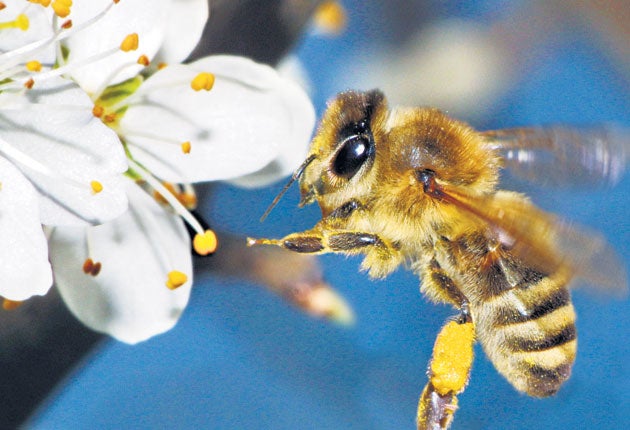Bee rustlers cash in on honey shortage
Rival keepers blamed for crime wave after dramatic decline

cattle rustling, then sheep rustling... now bee rustling is the latest crime to hit Britain's rural communities – and rival beekeepers themselves may be responsible.
A shortage of honey and growing winter losses of bees over the past two years have pushed up the value of honey bees to the point where they are a profitable target for thieves. A bee farmer in Shropshire has lost 100 hives, while in Hampshire alone, at least four farms have been hit in the past month.
Thefts have been reported in Selborne, north of Petersfield, Basingstoke and the New Forest. In the most recent incident, six hives worth an estimated £1,800 on the black market were stolen from a commercial farm at Micheldever, north of Winchester. The victim, John Cosburn, president of the Hampshire Beekeepers Association, said: "It has got to be someone who knows about bees, I mean would you want to move 40,000 bees?
"They would have needed the right equipment and know how to move them without killing them. I assume they were either stolen to order, or it was a desperate bee farmer whose hives had died."
The British Beekeepers' Association (BBKA) said it was "very sad" to think that the people behind the thefts might be beekeepers themselves. "We've always felt we were a supportive community," said the BBKA spokeswoman, Christine Gray. "It's a very unpleasant development."
While beekeepers normally expect to lose about 10 per cent of their stock over the winter, losses last year reached 30 per cent or even higher, probably because of the two very wet summers combined with the effects of parasites such as the varroa mite. As a result, in some areas bees and honey are in short supply; the dramatic decline in honey bee populations means that at the moment 80 per cent of honey is imported into the UK.
In Staffordshire, thieves sneaked into a honey farm and stole 18 hives full of thousands of bees. The hives, worth £5,000, were among 600 that Richard Lindsey, of the Great Little Honey Company, has dotted in fields round the countryside. He and his wife harvest the honey which they process at their home at Rowley Hill Farm, Stretton, near Penkridge.
He discovered the hives missing from a strawberry farm at Bolas Heath, just north of Telford, when he went to check on them. "It is the first time I have had any of my hives and bees stolen, but they are now very valuable. The value of both bees and honey has rocketed," he said. He would have been harvesting the first honey from the stolen hives this month and he has to find a replacement site which is more secure.
Although the thefts have been reported to police, keepers say there is little officers can do to stop the raids. Suggestions include branding hives, hiding them from view or even attaching satellite tracking devices.
The Hampshire Beekeepers' Association vice-chairman, David Nield, said the bees would have to be taken at least three miles away, otherwise their natural instinct is to fly home. "The next month is when hives are most vulnerable because honey is in full flow," he said.
The association's New Forest chairman, Nicholas Bentley-Buckle, said the widespread news coverage of Britain's bee crisis had led to an enormous surge in interest. "Our membership has almost doubled in the past two years and it is usually people who have heard about the plight of bees and want to help," he said.
Join our commenting forum
Join thought-provoking conversations, follow other Independent readers and see their replies
Comments
Bookmark popover
Removed from bookmarks